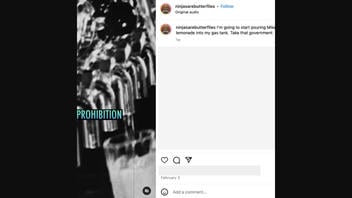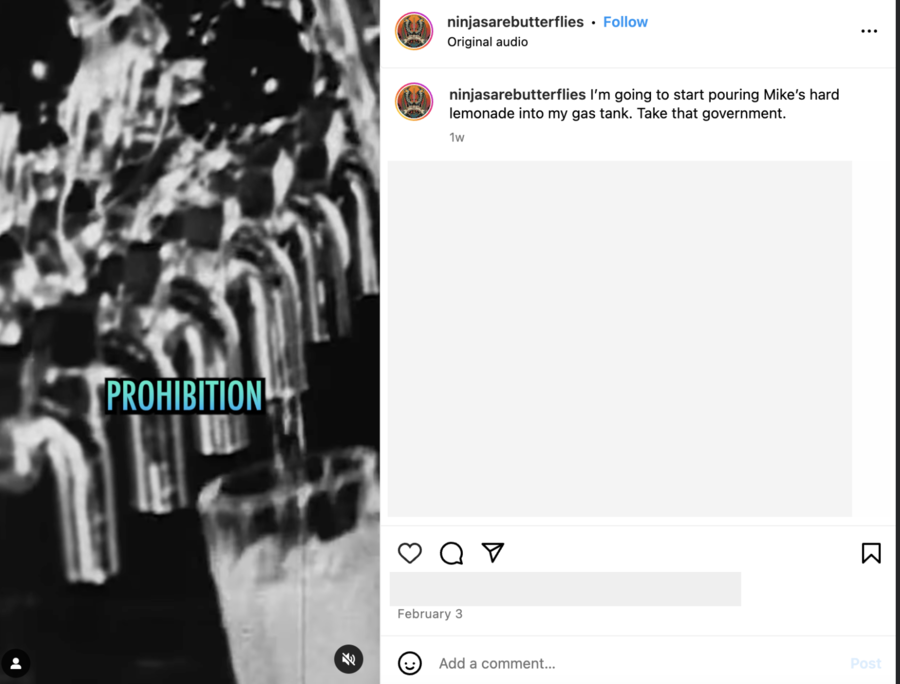
Was the purpose of Prohibition to stop people from fueling their cars and homes with alcohol? No, that's not true: Professors in history and sociology told Lead Stories that there's no truth to the claim. Prohibition in the United States, which ran from 1920 to 1933, was not about preventing people from using alcohol as fuel for cars or homes; rather, it was an attempt to reduce the negative effects of alcohol consumption on society.
The claim appeared in a post and video (archived here) on Instagram by ninjasarebutterflies on February 3, 2024. The caption said:
I'm going to start pouring Mike's hard lemonade into my gas tank. Take that government.
This is what the post looked like on Instagram at the time of writing:
(Source: Instagram screenshot taken on Tue Feb 13 17:57:49 2024 UTC)
The video
This 47-second video comes from the comedy podcast "Ninjas Are Butterflies," which is hosted by Andy DeNoon and Josh Hooper. Hooper's wife, Lily Hooper, and Andrew Saludez also appear on the show. Here's the full transcript of the video:
Lily Hooper: The purpose of the Prohibition is so much more different than ...
Josh Hooper: [interjects] What we were told?
Lily Hooper: At the time, people were using alcohol to fuel their cars and their homes. So, they were using it as energy and they were creating their own alcohols. It was a common practice to collect all your food scraps and ferment them in your home. And it was a completely renewable and easily attainable form of energy. And then they just banned it. They said, 'You can't make it. You have it in your house.' And they said it burns so cleanly ...
We wouldn't have any of the harmful environmental effects that we have today if we had continued this practice.
Josh Hooper: I've never heard that in my entire life.
Andy DeNoon: Same.
Lily Hooper: Isn't that crazy.
Josh Hooper: Pour a little bit of moonshine in there.
Lily Hooper: That'll get you going real good.
Josh Hooper: That's wild.
Lily Hooper: Think about it. What we truly know that the elites that were making those decisions were still drinking. They were still drinking during the Prohibition.
Andrew Saludez: That makes so much more sense.
Lily Hooper: There's no money in that.
Josh Hooper: Dude, that's insane.
Lily Hooper: I know.
While the source of the video was a comedy podcast, comments on the post show people took it seriously, and some tied it to big-government conspiracy.
One comment: "People need to wake up and understand who controls everything and who are the literal evils."
Another comment: "The prohibition laws only helped create a bigger wealth gap between the self sufficient middle/lower class and the upper class.. therefore giving the elites with the newly created federal reserve more control over the people."
The experts
Michael Lewis, a professor in sociology, social work and anthropology at Christopher Newport University in Virginia, said in a February 13, 2024, email to Lead Stories, "I'm just flabbergasted. Absolutely stunned!" referring to the claim in the post about Prohibition. He continued:
The Eighteenth Amendment prohibited the sale, manufacture and transportation of liquor. The main organization responsible for the Eighteenth Amendment was the Anti-Saloon League, not the anti-liquor league, the anti-drinking league, and certainly not the anti-use liquor to fuel your car league. The Drys carefully wrote the amendment to permit those who already had liquor to keep it and use it (a cut-out for the rich who had wine cellars and the like).
So theoretically if you had moonshine liquor on your property and kept it for your own personal use (to say, fuel your car) that wasn't technically prohibited by the Eighteenth Amendment.
Asked in a February 13, 2024, inquiry from Lead Stories if there was any truth to Prohibition claim as stated in the video, Richard F. Hamm, a history professor at the University of Albany in New York, responded on the same date, "ABSOLUTELY none." He added:
The prohibition policy embodied in the national amendment of 1920, and proceeded by the banning of alcohol in many states starting as early as the 1850s, was aimed at limiting the social harm caused by human consumption of alcohol. In fact, the industrial uses of alcohol were considered so important that lawmakers carved out exceptions for the production of industrial alcohol during national prohibition.
Hamm continued:
The whole idea shows an amazing ignorance of the realities of life at the time discussed. Prohibition agitation started long before cars became popular; in 1920 only 20% of American families had cars. Moreover, most people heated their homes with coal in the 1920s. There was no popular movement to brew your own fuel for use in liquid-burning furnaces.
Patrick Allitt, a history professor at Emory University in Georgia, told Lead Stories in a February 13, 2024, email, "I've never heard this claim before and I think it's extremely implausible." The reason being, he said:
Making your own car fuel would have taken a long time, been extremely inefficient, and would not have made the cars run as well as they did on gasoline, which was extremely cheap. ...
Allitt added:
The familiar and obvious story about Prohibition is also the correct one. Prohibition was the outcome of a long-running political movement that began way back before the Civil War and gained strength gradually in the late 19th and early 20th centuries. It was based on the fact that the consumption of alcohol led to violence, poverty, crime, and disease, disrupted families, and degraded the quality of American life. It had a strong religious component and was popular among women, especially Protestant women and social reformers.
Read more
Additional Lead Stories fact checks of claims related to social elites can be found here.


















